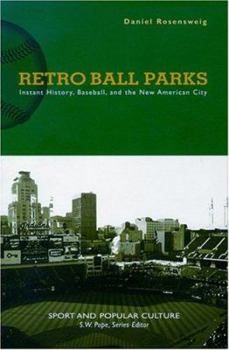Retro Ball Parks: Instant History, Baseball, and the New American City
(Part of the Sports and Popular Culture Series)
Oriole Park at Camden Yards in Baltimore opened in 1992 as an intentional antidote to the modern multiuse athletic stadium. Home to only one sport and featuring accents of classic parks of previous generations. Oriole Park attempted to reconstitute Baltimore's past while serving as a cornerstone of downtown redevelopment. Since the gates opened at Camden yards, more than a dozen other American cities have constructed "new old" major league parks - Cleveland, Detroit, Seattle, Pittsburgh, Milwaukee, Atlanta, Denver, Phoenix, San Francisco, Cincinnati, Houston, Arlington, Texas, and San Diego. In Retro Ball Parks, Daniel Rosenweig explores the cultural and economic role of retro baseball parks and traces the cultural implications of re-creating the old in new urban spaces. According to Rosenweig, the new urban landscape around these retro stadiums often presents a more homogenous culture than the one the new park replaced. Indeed, whole sections of cities have razed in order to build stadiums that cater to clientele eager to enjoy a nostalgic urban experience. This mandate to draw suburban residents and tourists to the heart of downtown, combined with the accompanying gentrification of these newly redeveloped areas, has fundamentally altered historic urban centers. Focusing on Cleveland's Jacobs Field as a case study, Rosenweig explores the political economy surrounding the construction of downtown ball parks, which have emerged as key components of urban entertainment-based development. Blending economic and cultural analysis, he considers the intersection of race and class in these new venues. For example, he shows that African American consumers in the commercial district around Jacobs Field have largely been replaced by symbolic representations of African American culture, such as piped-in rap music and Jackie Robinson replica jerseys. He concludes that the question of authenticity, the question of what it means to simultaneously commemorate and commodify the past in retro ball parks, mirrors larger cultural issues regarding the nature and implications of urban redevelopment and gentrification. Daniel Rosensweig is a professor in the Bachelor of Interdisciplinary Studies Program at the University of Virginia
Format:Hardcover
Language:English
ISBN:1572333510
ISBN13:9781572333512
Release Date:February 2005
Publisher:Univ Tennessee Press
Length:210 Pages
Weight:1.00 lbs.
Dimensions:0.8" x 6.3" x 9.5"
Customer Reviews
1 rating
new baseball parks and urban culture
Published by Thriftbooks.com User , 19 years ago
A work in the publisher's series Sport and Popular Culture, "Retro Ball Parks" looks at the urban phenomenon of the building of new, state-of-the-art, baseball stadiums to try to bring back this sport as it is viewed nostalgically. These are the stadiums built in cities around the country usually with some public funds and big tax breaks and other economic favors to the team owners. They are characterized by costly suites for corporate and well-to-do fans, rising ticket prices for all levels of regular seats from boxes to bleachers, moveable roofs and other features to provide comfort for the fans, and corporate logos lining the walls of the playing fields. Rosensweig is interested not only in how these stadiums promising revivals of urban centers come to be out of aspects of contemporary culture and political and economic interests; and also in the peculiar, particularly postmodern, notion of authenticity regarding baseball such stadiums are supposed to revive. In many cases, new businesses have sprung up around the new stadiums attempting to replicate neighborhoods that have been torn down to make way for them. Rosenweig's feelings on this phenomenon he covers are seen in the title of his introduction--"Cheap Grace." The author did most of his research in Cleveland, where the Cleveland Indian's Jacobs Field was built as the anchor of the Gateway Developmental District. "The Gateway serves as a fascinating case study of the cultural shifts enacted by the transformation of a city's economic base from local commerce and manufacturing to recreational tourism." Stadiums in other cities are brought in as well, notably the Baltimore Orioles' Camden Yards, the major urban stadium project giving rise to the others. Rosenweig is a professor of Inter-Disciplinary Studies at the U. of Virginia.





